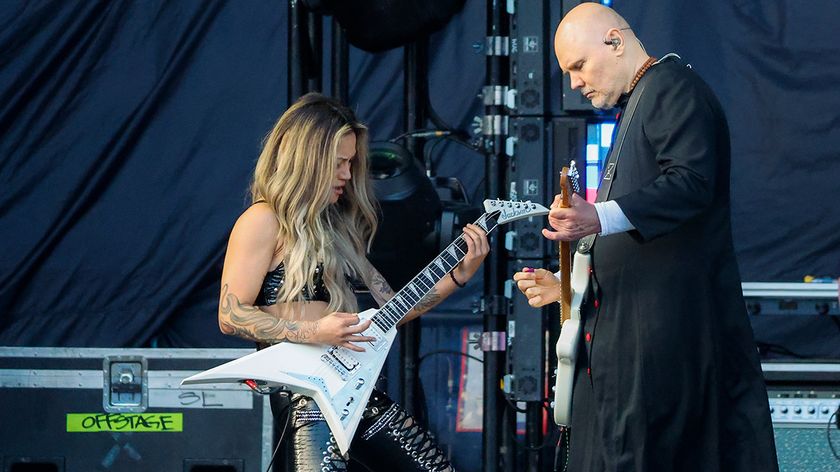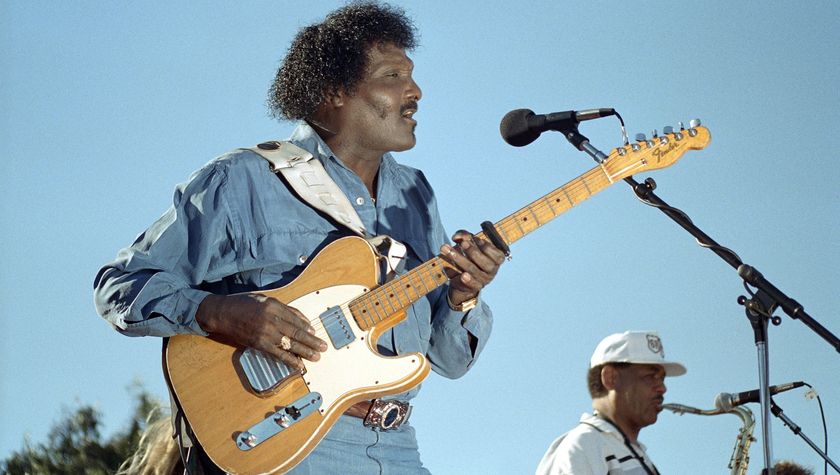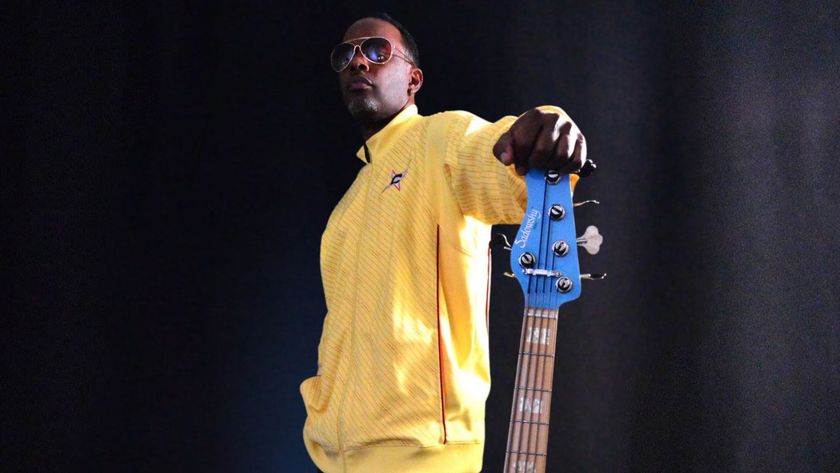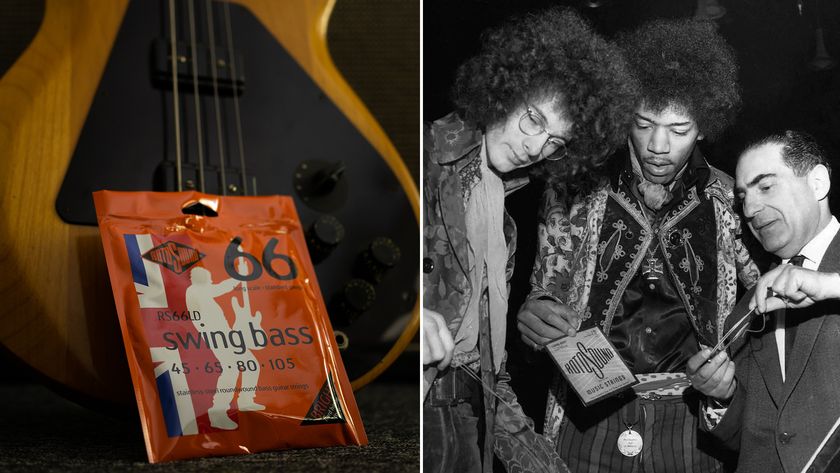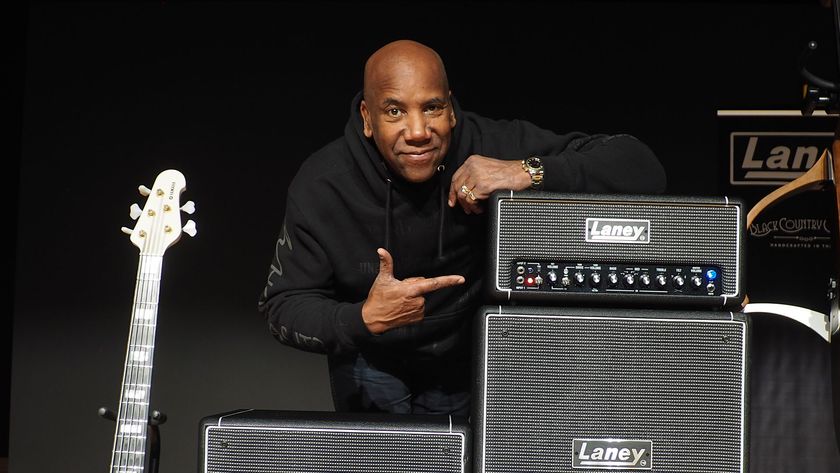Chris Cornell, Kim Thayil Discuss Soundgarden's Future
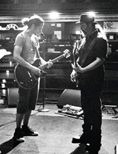
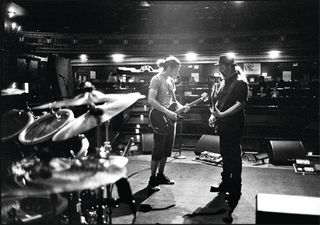
The only thing more shocking than Soundgarden's sudden breakup in 1997 was their sudden revival in 2010. Chris Cornell and Kim Thayil reflect on the group’s celebrated past and discuss its uncertain future.
If a time traveler landed in Chicago’s Grant Park on the evening of August 8, 2010, he probably would think his time machine was improperly calibrated and took him to 1996 by mistake. How else to explain the thousands of alternative-music fans converging at Lollapalooza to see Soundgarden? Seeing a field overflowing with a motley assortment of hipsters in horn-rimmed glasses and ironic T-shirts, long-haired rockers in combat boots and jeans, and tattooed Suicide Girls certainly gives one the impression that the Nineties never ended.
However, this event isn’t the touring monolith that Lollapalooza was in the previous millennium; rather, it’s a three-day festival in a single city. Some of the differences between then and now are subtle, like the Wayfarer-style sunglasses in neon colors being worn by some attendees, eyewear that would have looked painfully passé in 1996 but which is now retro hip. And somewhere along the line, alternative rockers apparently became foodies—how else to explain why vendors have abandoned the usual corn dogs and nachos for items like chilled watermelon gazpacho and “punk rock” shrimp. (Sorry, but only pizza or a greasy cheeseburger should be considered punk. Shrimp isn’t, unless someone spits on it.)
When the first droning notes of “Searching with My Good Eye Closed” blast from the speakers, it truly feels like a journey back in time, to a past that seems like only yesterday. Over their two-hour set, Soundgarden perform plenty of hits (“Black Hole Sun,” “Spoonman,” “Burden in My Hand”), fan favorites (“Rusty Cage,” “Jesus Christ Pose,” “Outshined”) and surprises (“Gun,” “4th of July”), with most of the material coming from their Badmotorfinger and Superunknown albums.
Soundgarden may look slightly different than they did the last time they graced a festival stage—singer/guitarist Chris Cornell has grown his hair out to Badmotorfinger length, and guitarist Kim Thayil sports a dapper fedora instead of a backward baseball cap—but they sound every bit as huge, powerful and invigorating as they did at their peak, maybe even more so. Bassist Ben Shepherd and drummer Matt Cameron—perhaps the most potent hard rock rhythm section of the past 20 years—fill the skyscraper canyons of Chicago’s skyline with thundering rhythms and deep, penetrating grooves. Cornell and Thayil’s guitars interlock to form majestically heavy riffs and psychedelic textures, while Cornell’s four-octave vocals float emphatically over the gloriously distorted wall of sound. Soundgarden’s characteristic combination of Sabbath-like riffs, hardcore punk energy, Zeppelin-esque folk flourishes and unique melodic finesse remains as fresh and vital as it was the first time around, defying the dated “grunge” tag within which the music industry once tried to confine the band.
Along with Nirvana, Alice in Chains and Pearl Jam, Soundgarden were one of the most commercially successful bands of Seattle’s grunge movement, which became a mainstream sensation in the early Nineties. Formed in 1984, they preceded those bands and helped establish Seattle’s thriving underground scene along with bands like the Melvins and Green River. Subsequently, Soundgarden became an important influence on groups that shared a similar affinity for grunge’s distinctive blend of metal, punk and Seventies sounds.
In 1989, Soundgarden brought national attention to Seattle when A&M Records released Louder Than Love—the first “grunge” album on a major label—paving the way for the success of dozens of other Seattle bands. The group reached its commercial peak with its 1994 album, Superunknown, which boasted the hits “Black Hole Sun,” “Spoonman” and “Fell on Black Days.” The band’s fifth and final studio album, Down on the Upside, followed in 1996, and after completing a world tour in 1997, the group called it quits.
Get The Pick Newsletter
All the latest guitar news, interviews, lessons, reviews, deals and more, direct to your inbox!
Considering the mysterious circumstances of Soundgarden’s breakup in 1997, their 2010 reunion was an unexpected event that seems to have taken even the band’s members by surprise. On January 1, 2010, Cornell tweeted, “The 12 year break is over and school is back in session. Sign up now. Knights of the Soundtable ride again!” The announcement was intended to communicate that Soundgarden’s fan club was up and running again, with the goal of informing fans about the impending release of historic recordings from the group’s vault. Soon, though, rumors that the band had reformed started to circulate, and soon some very attractive offers were presented to the band’s members that made them realize that a reunion might actually work and make sense.
But Soundgarden’s reunion is not the normal money-motivated cash grab. The group seems to have truly missed playing together, and they respect the band’s legacy. Instead of hitting the road with a big arena tour, Soundgarden has played only three full-length shows—a “secret” gig at the Showbox Theater in Seattle, a Lollapalooza warmup at Chicago’s Vic Theater and their full-blown headlining spectacle at Lollapalooza. In September, the band released the Telephantasm collection, which is available in several single- and multi-disc packages that provide an excellent overview of the band’s finest moments. The entire single-disc version of Telephantasm, which includes the previously unreleased song “Black Rain” from the Badmotorfinger sessions, was bundled with Activision’s Guitar Hero: Warriors of Rock, marking the first time a new music album was released as part of a video game. As of this writing, Soundgarden have announced no specific future plans. More shows are likely, but a tour and new studio recordings seem unlikely.
Cornell and Thayil sat down with Guitar World to reminisce about Soundgarden’s past and share numerous good memories. As they spoke, it was difficult to comprehend why the band ever broke up. No underlying animosity or ego conflict is perceivable, and their chemistry is unmistakably genuine. Describing the initial reunion, Cornell recently told MTV, “There were three minutes of ‘awkward first date,’ and then it was just stories of who threw up on what when.” He explained that outside pressure—not internal conflict—actually led to the band’s breakup. With the recent decentralization of the music industry, the members finally felt like they could take control of their own destiny on their own terms. While fans may have to wait a while to see the band live again or hear new material, Soundgarden’s current situation and positive attitude promise many good things to come.
GUITAR WORLD How does it feel to be working together after 13 years apart?
CHRIS CORNELL We were together for about 13 years as well. We were together and apart for pretty close to equal amounts of time, but it seems like the years apart went by a lot faster.
KIM THAYIL I don’t know if that’s a function of age and because there were fewer rites of passage. The past 13 years doesn’t seem that long, but the 13 years between 1984 and 1997 were really chockfull of events.
CORNELL Life was a lot more unpredictable between ’84 and ’97.
THAYIL We didn’t own property or have money.
CORNELL By the 2000s, when I was still touring, I was going to the same places where we had performed and I was playing the same stuff. Even when I made new albums, it felt like something I had already done before in my previous band, so it wasn’t as unpredictable or as pioneering as the original 13 years were.
GW Even though Soundgarden are now considered a “classic rock” band, your music still seems as fresh today as it was when the band broke up.
CORNELL That first dawned on me in 2000, after Soundgarden had been broken up for a few years. I was driving around Seattle, and I turned on the radio to a normal FM rock station. The song “Pretty Noose” came on, and I left the station on for a while to hear what they were playing. Suddenly, I realized that, even though it had been only a few years since we’d broke up, we had already fallen into this classic rock category, which is never going to go away. It wasn’t going to change two years from then, and it hasn’t changed in the 10 years since that moment. The same stations are still playing our music. That’s also the case with a lot of the other bands that were our peers. That couldn’t be planned. You can’t form a band and start recording music with the design that your music will last.
GW It seems like music has progressed very little over the past decade. Also, there’s not the huge generation gap that there was only a few years ago. Games like Guitar Hero are introducing kids to the music of their parents’ generation, and they love it.
CORNELL What I can’t understand is why the Seattle scene, which burst into national prominence in 1992, was the last really big rock scene to happen. Now it seems that everything is very fractured. A lot of the kids who would have grown up seeking out new rock bands and guitars are into hip-hop and whatever that quickly morphs into, which changes constantly. There are no specific scenes now. Music from 1992 doesn’t seem to be from an older or nostalgic musical period based on what we’re presented with today. There should be music out there right now that makes that music seem old and nostalgic, but there isn’t anything.
GW I think you’re right that rock and guitarists are not as influential as they used to be. Do you recall what it was that inspired you to pick up the guitar?
CORNELL I started playing guitar after Soundgarden formed. The first guitar I ever had was a Gibson ES-347, which is a 335 with a fine-tuning tailpiece on it. It was a little heavier than a 335, but I loved it. I used it on “Little Joe” on the Screaming Life EP. It was so nice that I was afraid to use it onstage, because the shows were so crazy. I ended up trading it for a used Twin Reverb amp and a Mexican Strat, but I really missed those tones. I’ve gone back to using 335s again, and it feels great. The tone sounds really good to me. It’s aggressive, but it’s not heavy metal.
GW Most guitarists form an emotional bond with their instruments. Kim, your Guild S100 has become almost like part of your identity.
CORNELL Kim has Guild S100s because he played them. Guild started making S100s again because Kim stuck with his original S100.
THAYIL They saw me with one on the cover of a guitar magazine.
CORNELL And then they multiplied! It’s like the Mommy and Daddy S100 got together and now Kim has a bunch of baby S100s, and in really cool colors that I’ve never seen before.
GW Chris, you’re known for using a 1989 Gretsch Duo Jet reissue.
CORNELL I have a very strong emotional connection to that guitar. Gary Lee from Screaming Trees bought it for me, and I would never let it out of my sight. It may only be a reissue, but it’s a very important guitar to me because I used it in the Temple of the Dog “Hunger Strike” video and on every Soundgarden record. It’s the main guitar on “Fell on Black Days.”
GW Although it wasn’t by design, the band was smart to call it quits back in 1997 before you had overstayed your welcome. You definitely left your fans wanting more, and people seem genuinely excited that the band has come back. It’s like the saying, “Absence makes the heart grow fonder.”
THAYIL Or is it absence makes the heart go wander? [all laugh] But it does seem to be the former. We did leave maybe not at the peak of our game but certainly close to it.
CORNELL We were at a place where musically we could do pretty much anything we wanted. We hadn’t painted ourselves into a corner in terms of who we were stylistically or what kind of genre we were in. We could make any type of music we wanted to make, but then we stopped being a band. If we wanted to make new music now, whether it’s an album or just a song, if it disappointed one type of Soundgarden fan it would probably please another type. But we’ve already kind of done that. One fan’s favorite record will be Badmotorfinger while another fan’s favorite record will be Superunknown or Down on the Upside. We did a lot of different things. The band consists of four songwriters, and we really didn’t like repeating ourselves.
THAYIL Five songwriters if you count Hiro [Yamamoto, bass player on Ultramega OK and Louder Than Love].
CORNELL At any given time, everyone in the band was writing. And when they were writing they weren’t thinking about the styles and tastes of the other members. We were always an eclectic band. We left things open for whatever we wanted to create. There was no concept of being subservient to the fans.
THAYIL People seem to have missed us, although there was some cynicism about us coming back, which is to be expected. I’ve always been cynical when a band reunites, but it’s kind of weird to see someone else pick up on that. Most people who do that focus on the lifestyle or pop culture element of a band whose day is done. People who actually know music and bands also know how rock culture develops and how bands influence each other. A lot of new bands have come up, and so many of them tip their hats to us personally and directly. That’s a big source of pride. We’re probably more remembered by the legacy we’ve left. The bands in indie metal, punk and underground music we’ve influenced will probably be influencing other bands for a long time. It’s really strange to find out the level of influence you’ve had, especially in all the different ways it’s manifested itself. There are bands and movements that have blossomed from specific songs we recorded. “4th of July” is one example.
CORNELL “Loud Love” is another. Many people have told me that that specific song was a big influence. That was an interesting moment for us. A lot of people don’t know that Ultramega OK outsold Louder Than Love, which came out after Ultramega OK and was on a major label.
THAYIL And Ultramega OK spawned Smashing Pumpkins and Nirvana. Guys in both of those bands have said that to us and they’ve said that in interviews. That album showed them that a band could have metal elements but you didn’t need to be a bunch of dumbasses.
CORNELL When Louder Than Love came out, “Loud Love” and “Get on the Snake” actually got onto commercial rock radio. They weren’t in regular rotation, but they did get played. I remember when we were going to play a show in Los Angeles and KNAC played the song. It was the most unusual moment, because it made perfect sense to hear it on the radio, even though it sounded huge and was unlike anything else they played before and after. I got a feeling of excitement. It felt vital and exuberant. When those songs got a little bit of airplay, it showed people what was possible, and that helped open the door to all of these bands that followed. It was this whole idea of new rock that would still work within the commercial rock formula even if it was side by side with Tom Petty or Bon Jovi.
THAYIL Even though alternate tunings like drop D already existed and people were aware of them for a few decades, suddenly the popularity of alternate tunings went through the roof. Bands like us, Alice in Chains and Nirvana made drop D tuning huge. We were into other things as well, like drop C, drop B and C-F-C tuning. We used weird open tunings, like open D dropped a whole step.
CORNELL “Burden in My Hand,” was in open C but with one of the C's tuned to G [low to high, C G C G G E].
THAYIL Which is a slide tuning.
CORNELL Then there was the tuning that we used on “Somewhere.”
THAYIL Which was a bunch of E's and B's [low to high, E E B B B B].
CORNELL And we used that for “My Wave.” I had never heard that tuning before.
THAYIL “Rusty Cage” is a huge, popular song, and it was tuned down to B. For a while bands were trying to outdo each other. “They’re tuned down to D. Let’s tune down to C.” “Let’s tune down even further.” All of a sudden all of these bands were tuning way down and using heavier strings. That’s always been the thing about hard rock and metal. “We can play it faster!” “We can play it louder!” “We can play it lower!” “We can be more rock or more metal!” Then along came Sunn O))) who pushed it to the ultimate lowest with some weird tuning that’s really low and uses bass strings. They’re one of our favorite bands, and I know for a fact that we were a huge influence on them.
GW I remember reading about Soundgarden for the first time back in 1989 and the writer made a big deal about how slow your songs were. This was back when bands like Metallica, Megadeth and Slayer were getting attention for being faster than everything else. People had forgotten that slower music often sounds heavier because the notes have room to breathe and grow.
THAYIL There’s no room for psychedelic in fast. There’s no room for drone. There’s no room for tension that builds in space.
CORNELL There’s no feedback in fast either.
GW And Soundgarden played its share of fast songs as well, like “Face Pollution” and “Ty Cobb.”
THAYIL Sure, but it wasn’t the band’s signature. We played fast in different ways. It’s one thing to come up with a radical idea, like those galloping speed-metal picking techniques. But then everyone did that, and if you didn’t play that way it was considered something other than metal. It was very conformist. The same thing happened with punk rock. People would say things like, “If you’re playing a guitar solo it isn’t punk rock!” Fuck all of you guys.
CORNELL Right before we started Soundgarden, I was in a band that was started by a couple of Jamaican guys and this guy from Seattle. We played reggae but we also played ska, and we did both things very well. I remember how much that upset fans of one style or the other. They told us we couldn’t do both. At the time I wasn’t a big fan of either style, and I thought the distinction was really silly. I also was frustrated by the punk genre. Punk had no room to breathe until the early Eighties—
THAYIL —when Black Flag slowed down and Hüsker Dü came along. It breathed for a little while before it was closed off again.
CORNELL And people complained that it was too commercial or too metal. Some post-punk bands broke the punk mold right away. I don’t like it when the most important thing is what you don’t do as opposed to what you do. “You can’t do this! You can’t do that, otherwise you’re not this!” Then there are rules and you can only do less.
THAYIL You’re always setting boundaries. You have to ask, “If we do that, is that us?” But it’s better to do that from within a band than to have that determined by some outside subculture. We benefited from the fake polarity between punk and metal. People may go, “Why are Soundgarden at Lollapalooza? They’re a metal band.” But punk and metal come from the same end of the spectrum. They’re both suburban white guys playing distorted guitars. We benefited because we attracted fans that thought we were a metal band as well as fans who thought we were a punk band.
CORNELL Some people thought we were too Seventies. In the very beginning when Soundgarden started, the Seventies were bad in any context. There was no such thing as good Seventies anything.
THAYIL We took a lot of chances and risks, and, ultimately, it worked out. There were people who liked us for having elements of metal and punk and people who felt that we didn’t abide by their standards for those subcultures, which was fine with us. We weren’t going to go to their parties anyways.
CORNELL I remember when we did these shows where the audience unanimously hated us and we played very well. Both of the times that happened, I remember being extremely happy afterward: I knew that we did a great show, and I knew that everyone hated it. One was a show that we did in Vancouver, and Mike Bordin from Faith No More was there. That was before Mike Patton was in the band.
THAYIL Oh! That was when someone threw a glass at you.
CORNELL They threw an ashtray that almost hit me in the head. Mike was there with Anna Statman, who had signed Faith No More to Slash Records, and they were beside themselves. They thought they had seen the best show they had ever seen from any band, but the rest of the audience hated our guts. The only person whose opinion I cared about was blown away by it, but that was juxtaposed by playing in a room full of people who really hated it. I felt like we were really on to something.
THAYIL Like we knew something that they didn’t.
CORNELL Then we did another show at North Seattle Community College, which had a budget for entertainment. We had a friend who booked bands there and could pay us. The poster said “Two-Band Dance.”
THAYIL It was with a local group called the Beat Pagodas. When we played everyone sat there upset, waiting for us to get done so the Beat Pagodas could come on.
CORNELL When we started playing, I somehow kneed myself in the face and blood was gushing out of my nose. There were all these college students who came there with their dates to dance, and here was Soundgarden with this singer who was bleeding profusely. Everyone got off of the dance floor and was standing with their backs against the wall. I threw my mic stand like a spear, and when it hit the floor it slid all the way across the empty dance floor. As it approached the people who were standing against the wall they just separated and let it hit the wall. They had no emotion. Everyone just sat there until we were done.
THAYIL Our six-foot-three friend Milton Garrison from the post-punk band Vexed went out on the dance floor and started doing his weird, funny dances to us.
CORNELL That went beyond not being liked. People were having such a horrific time, and they didn’t understand us at all. It was like this massive cultural divide. Because of that weird alienation, that’s one of my favorite shows of all time.
THAYIL Pissing people off is supposed to be one of the prime elements of rock. Sometimes that means saying “fuck you” to the people that you care about.
CORNELL That’s one of those moments where a band can explode into consciousness. Everyone celebrates that fuck you-ness and the alienation that it creates when they wear your band’s T-shirt. But then it becomes an immediate trap door when you put out your second album. How do you say “fuck you” to the 10 million people who bought your record? But you have to do that. If your life starts based on fuck you, where does it go when fuck you doesn’t mean anything? That’s when you need to have legs and a deep enough record collection so that you can become something that replaces the “fuck you.”
GW Are there any plans for the immediate future beyond the shows you’ve done and the Telephantasm collection?
THAYIL There are always ideas and thoughts. Nothing has been set ahead. It’s more a matter of if we feel like doing something when the time comes.
CORNELL Up until now this is it. We decided at some point that we should play at Lollapalooza—
THAYIL —and put together Telephantasm. That’s been the focus for the present moment. We haven’t been thinking beyond that. I can say with assuredness that there will be other records that venerate the band’s legacy, along with some merchandise. Matt is working on live recordings from our last tour. We also want to re-release records that have been out of print. Screaming Life is technically out of print, although Sub Pop recently released a 20th anniversary edition of it. Technically, Ultramega OK is out of print, although SST can make you a copy of a CD if you order it through their web site. There are issues with the availability of Louder Than Love. Then there are all these B-sides that we want to compile as a companion to the A-Sides collection. We definitely plan on releasing collections and packages of unreleased and uncompiled Soundgarden material. I can assure that you’ll see more of that over the next couple of years.
GW At this stage do you see the band making another 13-year run?
THAYIL I definitely cannot see doing another 13 years, because I couldn’t see doing the first 13 years. When you’re in your late teens or early twenties, you don’t plan that far ahead. I imagine there are some people who do in hopes of getting the gold watch when they retire, but I’m not that person, and I don’t think any of the other guys are either.
CORNELL I remember when the entire band was in a room together doing an interview around the time Louder Than Love was about to be released. Someone asked us what we saw ourselves doing 10 years from now. Ten years sounded like a really long time, but that was actually 20 years ago now. My answer was that I didn’t want to know what I’d be doing 10 years from now or even to plan for it. I remember having a band meeting and someone came up with the idea of us coming up with a two-year plan. I thought that was creepy.
THAYIL If you’re drafting a business model you might want to sketch that out.
CORNELL But when you’re in a band, you can’t map everything out. Everything we did was something unpredictable that came up at the last minute. It wasn’t even possible to make a two-year plan because of all the unpredictable events that crushed that. I can always say pretty confidently that I want to be doing something with music, but who knows if some other passion will get a hold of me in the next 10 years? That’s always possible.
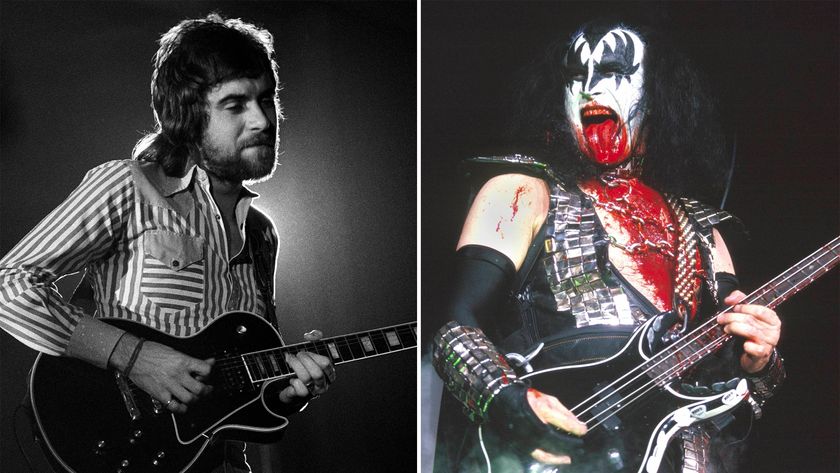
“I had to use the same microphone that Gene Simmons used with all the blood coming out of his mouth. Can you imagine that!”: Mick Rogers recalls Kiss supporting Manfred Mann's Earth Band in their early days

“Once Dave got his Roland Space Echo, it changed the vibe… that, and a lot of marijuana”: They inspired everyone from Oasis to the Smashing Pumpkins. Now English post-punk luminaries the Chameleons are back for more
